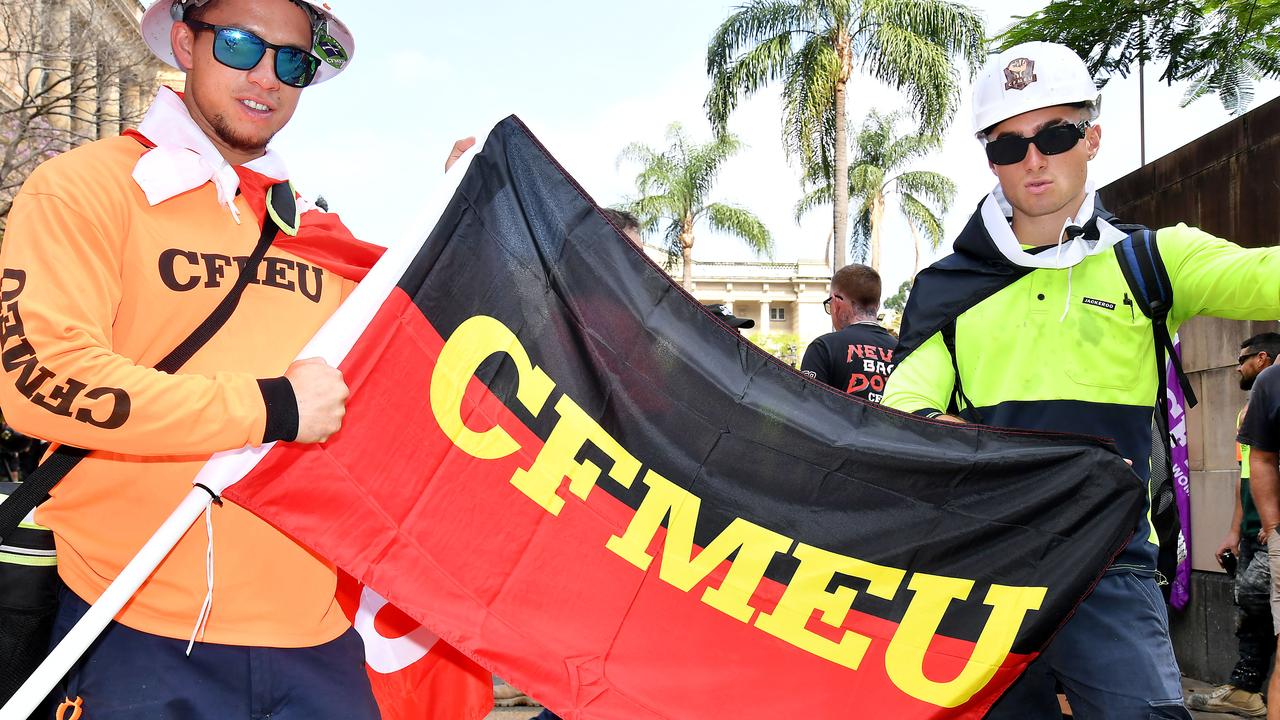‘Fifo Man’ Luke Baker reveals what it’s really like to be a fly-in fly-out worker
THE salaries are well into six-figures, often for jobs that don’t require tertiary qualifications. But there’s a dark side to life as a fly-in fly-out worker.

At Work
Don't miss out on the headlines from At Work. Followed categories will be added to My News.
FIFO worker Luke Baker knows what it’s like to be so homesick you dread the few hours of free time you get each day.
The communications specialist spends three out of four weeks on the road, away from his fiancee and her three kids.
While he only started this role at the beginning of the year, he has worked FIFO (fly-in fly-out) roles before, and understands the pressure and loneliness that is a part of life in a remote camp.
Like most FIFO workers, his pay packet is healthy. Salaries are usually well into the six-figures, often for jobs that don’t require tertiary qualifications. So it’s no surprise workers are signing up for the gigs.
But there’s another side to the job that the rest of Australia doesn’t see, and that’s the loneliness that comes with leaving your family and friends behind.
A typical day for Mr Baker starts at 4am with a quick shower before stopping off at the dining hall for breakfast. Most workers also grab lunch at the same time as they’re often working offsite in remote locations that make it difficult to return to base for lunch.

While it changes, it’s not uncommon for him to work 12-hour days, returning to camp at 5pm or 6pm. And then it’s another shower and back to the dining hall for dinner.
For the next couple of hours, it’s your own time with some workers congregating socially, others hitting the gym, or going back to their rooms to catch whatever is on TV.
Mr Baker told news.com.au that many camps are dry (meaning no alcohol allowed), and even the ones that do allow drinking will generally limit everyone to three middies of mid-strength beer.
There’s also not much burning of the midnight oil unless you’re happy to survive the next day on four hours of sleep.
The rooms themselves are spartan, consisting of not much more than a bed, a desk, a small fridge, an ensuite bathroom and a TV (sometimes with Foxtel channels).

“Most of [the rooms] are not much more than a prison cell,” Mr Baker said. “I make that comparison because I’ve worked in a prison for 12 months and sometimes it feels like that to me.”
Mr Baker, who’s not attached to one camp permanently, said the culture of the work camps vary from place to place. He’s found some to be warm and friendly and others less so. They’re usually isolated affairs with most things taking place within the compound. The camp he’s currently in is 50km from the nearest town with any decent facilities.
“People laugh but the thing that can make or break the camp is the food,” he said. “When you’ve got not much else, the meals are the only thing that you look forward to; it’s the only thing that changes. For example, a couple of the camps have seafood night every second Sunday.

But if it’s terrible, it can make you miserable. It sets the day off on the wrong tone.”
Mr Baker said being away from his fiancee and her three children for three weeks out of a month has taken a toll on him emotionally.
“You have these sinking, lonely feelings,” he said. “You feel isolated and alone.”
But while support groups for the partners of FIFO workers (those left behind) have formed on social media networks, he found scarce resources for the workers who go out to make the dosh. He started the ‘Fifo man’ page on Facebook only four days ago and it’s already garnered more than 1700 ‘likes’ and many comments.
People reacted to his very personal account of being stuck at the camp on a day when it was too wet to work.
“Today is one of those days you kind of hope for, but at the same time dread,” Mr Baker wrote.
“It’s raining so because we are in such remote locations on some terrible roads the company shuts down the roads to all project vehicles so we’re confined to camp.
“When you work every day for between 10-12 hours a day, day after day after day you kind of look forward to having a day off. At the same time it is a day that you dread. You dread the thought of sitting around in your tiny little prison room with nothing at all to do except watch tv and think. There are some things to do around camp like play pool but on days like today it’s hard to get a go because everyone is confined to camp.

“So the choice for me is to watch TV or to think. Now thinking out here can get very dangerous. For me it can anyway. I think about my family at home and how I’m out here to make money so I can provide a better future for them. It absolutely kills me to be away from them so the thought of being out here and not working really make’s it seem like such a waste. Day’s like today you just really wish you could be at home with the family watching kids movies cuddled up on the couch with them and not wasting a day out here.
“I guess the positive about all this is when I am at home for my week off and I’m watching cars 2 for the 12th time in 5 days, I can still just sit there cuddled up with the kids and be the happiest man in the world because I know how precious that time is.”
People started sharing his page immediately, telling Mr Baker his thoughts had helped them understand the FIFO life.
“I started that page because I thought it might help people,” Mr Baker told news.com.au. “Men in general feel intimidated to talk about these things. Blokes want to talk about how much of a d**khead that person is or about the boss. Generally speaking, I don’t hear a lot of guys talk about how lonely they feel.”

“I had no idea the page would be this popular. In many of the comments and messages, a lot of the guys are saying they feel exactly the same way. I’ve seen some blokes say they’ve had problems expressing these feelings to their partners — not because they can’t talk about it — but more because they don’t even know how to describe it. It’s a way to get it out.”
Mr Baker said while the life of a FIFO worker was hard, it’s a sacrifice you make for your family. While he wasn’t in dire financial straits and had a well-paying job, the opportunity was too good to pass up. “I’m actually doing it for a purpose. It’s a choice I made so our family can have a better future,” he said.
Originally published as ‘Fifo Man’ Luke Baker reveals what it’s really like to be a fly-in fly-out worker



